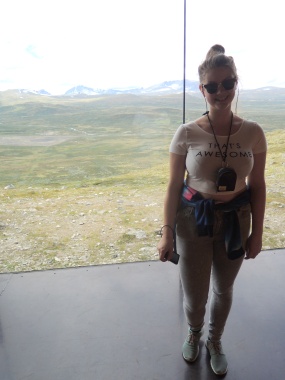The Perception of Time
With the working title “The Hours”, Mrs. Dalloway is a novel which is, not surprisingly, about time. However, by changing the title, Woolf made the theme more subtle. The film “The Hours”, based on the novel by Michael Cunningham, reintroduces this title to underscore the common theme. Through the use of different narrative techniques, such as broken chronology, narrative and point of view, both stories depict how time can be perceived differently.
Firstly, a broken chronology is used to separate the objective and subjective time. Both Mrs. Dalloway and “The Hours” happen during the course of one day, thus giving a linear time-frame for the events. However, in Mrs. Dalloway the objective time is constantly challenged by an inner time, namely the characters subjective perception of time. This is depicted through the stream- of- consciousness method, showing how ones thoughts are never only in the present. Likewise, the chronology in the film “The Hours“ is broken by the fact that the three stories are seemingly entwined and affected by each other, despite the separation in time, and that they begin with the end. By using chronology and a broken chronology as a technique, the inevitable passage of time is contrasted with the characters drifting thoughts in Mrs. Dalloway and the separation in time in “The Hours”.
Likewise, narration is used to contrast the passage of time with people’s inner time. For instance, in Mrs. Dalloway, Woolf uses the stream- of consciousness method as a narrative technique. This method allows the reader to experience the characters thoughts, and consequently their perception of time, as their thoughts drift from the present to the past and future. The daydreaming is consequently broken off by the sound of Big Ben each hour, bringing them back to the present. However, as a film, “The Hours” does not have the same ability to convey the thoughts of the characters as they are depicted by the narrator. Yet, the past is often a subject of conversation, and, the lives of the characters are at several occasions broken off by the sounding of a clock. The effect of breaking off the characters’ daydreaming is that their inner time is contrasted with the inevitable passage of time.
The point of view is also central in depicting the inner time. The narrator in Mrs. Dalloway is omnipresent, like a cloud hovering over all the characters, plunging in to one person’s mind after the other. By breaking up the point of view, Woolf manages to depict the diversity in how people perceive time. The linear time, showing that each second brings us closer to death, evokes a different sentiment in the characters. “There! Out it boomed, first a warning, musical; then the hour, irrevocable” (Woolf, 1925). Whereas Clarissa Dalloway is afraid of the time passing and the prospect of death, Septimus seems at ease with the passage of time and, consequently, he welcomes it as he later welcomes death. In contrast, “The Hours” does not have the same opportunity to plunge into someone’s mind, instead the shifting point of view is conveyed through skilled editing. For instance, the film focuses on similar events in the life of the characters, and uses these similarities to make an effortless transition between the different stories. For instance, in the beginning, when Woolf thinks of an opening line to the book, the story is cut to the story where Laura is reading the line, and then to Clarissa buying the flowers. The understanding of the inner time, however, demands a better insight into the minds of the characters. The shifting point of view is, therefore, a way of showing time as individual rather than only objective.
To conclude, the novel Mrs. Dalloway and the film “The Hours” both depict the passage of time. By using different narrative techniques to convey the theme, the linear passage of time and the subjective perception of it is separated and contrasted, and leaves the reader with the impression that time is a big part of someone’s life.
Literature
Daldry, S. (Director). (2002). The Hours [Motion Picture].
Woolf, V. (1925). Mrs- Dalloway .
– Kristin





















